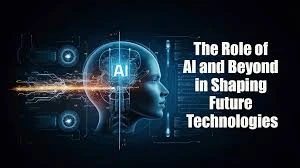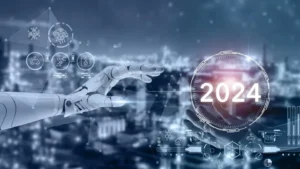
Artificial Intelligence (AI) is no longer a distant dream; it’s a transformative force shaping the future of humanity. From revolutionizing future technology to spearheading digital transformation, AI’s influence spans industries, governments, and individual lives. This article explores how AI is molding tomorrow, delving into its applications, trends, and broader impacts, while addressing ethical concerns and the need for effective AI governance.
Introduction
Imagine a world where autonomous vehicles dominate roads, smart cities optimize resource usage, and AI-powered tools simplify our daily tasks. This isn’t science fiction; it’s the reality AI is building. As an emerging technology, AI integrates with machine learning, deep learning, and data analytics to redefine innovation. But how is it shaping the future? What challenges lie ahead? Let’s dive into AI’s pivotal role in shaping a more connected, efficient, and intelligent world.
How AI is Transforming Key Industries
1. Smart Cities
AI plays a significant role in building smart cities by improving urban infrastructure, optimizing energy consumption, and reducing traffic congestion. AI-driven predictive analytics allows city planners to anticipate problems and create sustainable solutions, making urban living more efficient and eco-friendly.
2. Healthcare AI
AI’s integration into healthcare is a game-changer. It supports early diagnosis through data analytics, powers advanced imaging techniques, and enables personalized treatment plans. For example, natural language processing (NLP) helps analyze patient records, while robotics assists in surgeries, enhancing precision and reducing recovery time.
3. AI in Education
AI fosters human-AI collaboration in education by tailoring learning experiences to individual needs. Intelligent tutoring systems, AI-driven assessments, and chatbots for student support redefine how education is delivered, bridging gaps in accessibility and quality.
4. AI in Finance
The finance sector relies heavily on AI for fraud detection, risk management, and algorithmic trading. By leveraging automation and data analytics, institutions gain real-time insights, streamline operations, and improve decision-making accuracy.
5. Autonomous Vehicles
One of the most revolutionary applications of AI is in autonomous vehicles. Self-driving cars use deep learning and predictive analytics to interpret road conditions, enhance safety, and reduce traffic-related incidents, setting the stage for a transportation revolution.
Emerging Trends in AI
1. AI-Driven Decision-Making
Businesses increasingly adopt AI-driven decision-making to optimize operations, enhance customer experiences, and drive revenue. AI algorithms analyze large datasets to provide actionable insights.
2. Quantum Computing and AI
The fusion of quantum computing and AI promises to solve problems previously deemed insurmountable. From complex simulations to real-time optimizations, this synergy is a significant milestone in future technology.
3. Ethical Dilemmas in AI
The rise of AI brings ethical challenges, from data privacy concerns to bias in algorithms. Navigating these challenges requires robust AI governance and adherence to digital ethics to ensure AI benefits society equitably.
4. Human-AI Collaboration
Contrary to fears of job loss, human-AI collaboration demonstrates how AI complements human skills. From creative industries to scientific research, this partnership boosts productivity and innovation.
5. Technological Singularity
The concept of technological singularity, where AI surpasses human intelligence, sparks both excitement and caution. While it promises breakthroughs, it underscores the importance of maintaining ethical and regulatory frameworks.
Broader Impacts of AI
1. Social Change
AI fosters social change by addressing societal challenges, from improving healthcare accessibility to enhancing education in underserved areas.
2. Economic Transformation
AI drives economic transformation through automation and innovation. By streamlining workflows and creating new business models, it reshapes industries and global markets.
3. Impact on Job Market
While automation raises concerns about job displacement, AI also creates opportunities in tech development, AI-powered tools, and research and development (R&D), requiring reskilling the future workforce.
4. Technological Disruption
AI’s integration into emerging technologies such as the Internet of Things (IoT) and Industry 4.0 transforms traditional processes, pushing boundaries in efficiency and connectivity.
5. Policy-Making and Regulations
Effective policy-making is essential to regulate AI’s applications and ensure ethical usage. Governments and institutions must address concerns like data privacy, algorithmic bias, and the impact of AI regulations on innovation.
Ethical Considerations in AI Development
The development of AI comes with significant responsibilities. Adhering to digital ethics ensures systems remain unbiased and fair. Governments and tech leaders must collaborate to establish comprehensive AI governance that addresses societal impacts and prevents misuse.
Conclusion
Artificial Intelligence is more than a technological advancement—it’s a catalyst for social change, economic transformation, and innovation. By driving future technology, enhancing human-AI collaboration, and reshaping industries, AI is building a smarter, more sustainable world. However, achieving its full potential requires addressing ethical concerns and implementing robust regulations.
For more interesting blogs, visit our site: https://futuretrendz.co.uk/
FAQs
1. How does AI contribute to sustainable development?
AI enhances sustainability through predictive analytics, resource optimization, and promoting energy-efficient practices in industries and smart cities.
2. Will AI replace human jobs?
While automation may replace certain roles, AI also creates new opportunities, particularly in R&D, AI-powered tools, and the future workforce. Reskilling efforts are crucial to adapt to this shift.
3. What are the ethical challenges of AI?
Challenges include data privacy, algorithmic bias, and ensuring equitable access to AI technologies. Ethical dilemmas in AI highlight the need for strong AI governance.
4. How is AI shaping healthcare?
AI transforms healthcare through personalized treatments, robotics in surgery, and NLP for analyzing medical records, enabling faster, more accurate care.
5. What is the future of AI in education?
AI in education enhances accessibility, customizes learning experiences, and bridges gaps in quality through AI-driven decision-making and intelligent tutoring systems.






